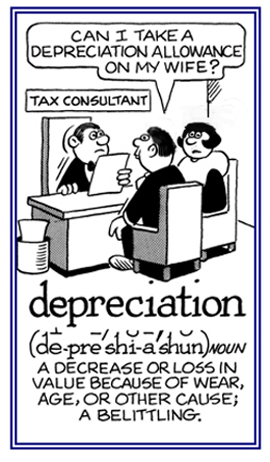preti-, prais-, preci-, pric-
(Latin: price, reward, prize, value, worth)
Someone who considers something carefully and forms an opinion regarding it: Patricia was an appriser who went shopping and compared the prices for food products for economic reasons.
1. To reduce or to lower the value of: Runaway inflation has resulted in the depreciations of the currencies of many countries.
2. To belittle, to disparage: Henry always seems to have a depreciation for all of his mother's efforts to help him complete his homework for school.
3. Etymology: from Latin depretiare, "to reduce the price of"; "to make less valuable".

© ALL rights are reserved.
Go to this Word A Day Revisited Index
2. To belittle, to disparage: Henry always seems to have a depreciation for all of his mother's efforts to help him complete his homework for school.
3. Etymology: from Latin depretiare, "to reduce the price of"; "to make less valuable".

Go to this Word A Day Revisited Index
so you can see more of Mickey Bach's cartoons.
depreciative
depreciatively
dispraise
The gradual loss of efficacy of a lamp over time, typically caused by the loss of chemical additives in the lamp and wall darkening in the arc tube: Lumen depreciation can be indicated by a curve depicting the pattern of decreasing lucid output.
The florescent illumination in Mildred's kitchen started to flicker, apparently because of the lumen depreciation in the tubes.
praise
praiser
precious
preciously
preciousness
price
priceless
pricelessness
1. An honor or reward striven for in a competitive contest or anything offered as an inducement to do something in order to be won: A lottery is just one example of winning prizes.
2. That which is taken from another or something captured or seized by force, stratagem, or superior power: A prize is also anything worth striving for or a valuable possession.
3. Etymology: from Middle English prise, from Old French prise, "a taking, a thing seized, a prize, booty", from pris, past participle of prendre, "to take, to capture", from Latin prendere, "to take, to seize".
2. That which is taken from another or something captured or seized by force, stratagem, or superior power: A prize is also anything worth striving for or a valuable possession.
3. Etymology: from Middle English prise, from Old French prise, "a taking, a thing seized, a prize, booty", from pris, past participle of prendre, "to take, to capture", from Latin prendere, "to take, to seize".
Showing page 2 out of 2 pages of 30 main-word entries or main-word-entry groups.

